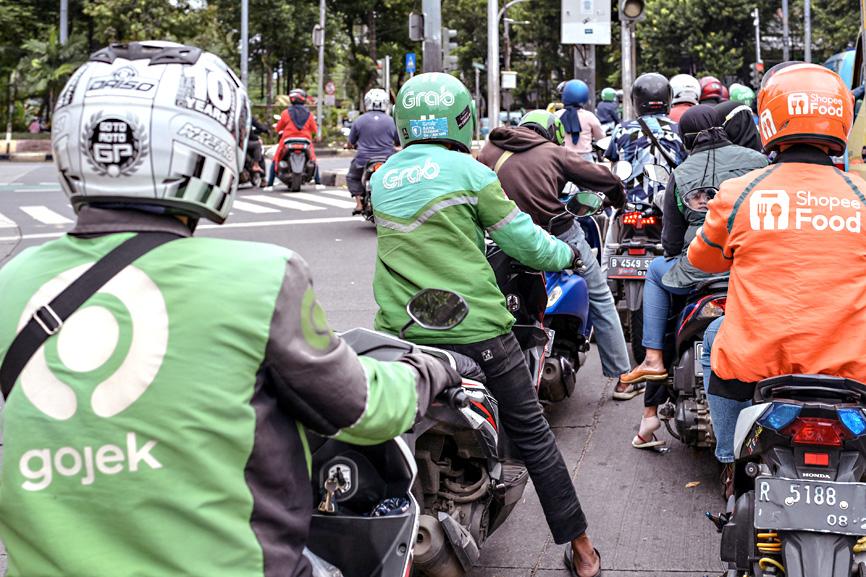GoTo is to give away thousands of shares to each of 600,000 drivers as part of its US$1.1 billion Indonesian initial public offering (IPO), it said yesterday, setting a precedent for Southeast Asia’s sharing economy.
Drivers who registered with the ride-hailing and delivery app between 2010 and 2016 would receive 4,000 GoTo shares, equivalent to US$94 based on the IPO price of 338 rupiah. Those who registered from 2017 to February would get 1,000 shares, part of a total pool of more than US$20 million allocated for drivers, it said in a statement.
GoTo, formed through the merger of Gojek with e-commerce pioneer Tokopedia, raised US$1.1 billion in one of the biggest stock debuts this year and is slated to list in Jakarta on Monday next week.

Photo: AFP
While the giveaway represents a token amount, GoTo becomes the first major sharing-economy giant in Southeast Asia to include part-time gig workers in its own IPO windfall.
“It’s an acknowledgment that our driver-partners are part of our success,” chief executive officer Andre Soelistyo said in an interview. “This is something we’ve wanted to do since the beginning.”
App-based gig-economy companies are typically built on the backs of low-wage contract workers, who work long hours but continue to lack employee benefits like health care or a safety net.
Their plight has gained regulatory and public attention in the past few years, particularly during the COVID-19 pandemic when Internet platforms flourished, but social inequities widened. Singapore and other governments are considering legislative changes to protect gig-economy workers.
Uber Technologies Inc and Lyft Inc, which went public in 2019, gave frequent drivers cash to buy stock in the US, but the practice in Asia is rare.
South Korean e-commerce firm Coupang Inc promised staff and frontline workers about US$90 million worth of restricted stock. GoTo’s rival Grab Holdings Ltd — which went public through a merger with a blank-check company in December last year — handed out rewards equivalent to US$1.4 million to drivers and merchant partners in Indonesia ahead of its listing.
GoTo’s drivers, who are not classified as employees, but independent contractors, might choose to hold the stocks or cash out after an initial eight-month lockup period, the company’s prospectus showed.
The “Gotong Royong” share grant to drivers is part of a broader program that includes merchants, consumers and employees. Loyal merchants and consumers of Gojek and Tokopedia got priority access when ordering GoTo shares during the book-building period.
All full-time employees have received equity under the program, Soelistyo said.
The company had a total of 8,540 staff at the end of July last year.

United Microelectronics Corp (UMC, 聯電) expects its addressable market to grow by a low single-digit percentage this year, lower than the overall foundry industry’s 15 percent expansion and the global semiconductor industry’s 10 percent growth, the contract chipmaker said yesterday after reporting the worst profit in four-and-a-half years in the fourth quarter of last year. Growth would be fueled by demand for artificial intelligence (AI) servers, a moderate recovery in consumer electronics and an increase in semiconductor content, UMC said. “UMC’s goal is to outgrow our addressable market while maintaining our structural profitability,” UMC copresident Jason Wang (王石) told an online earnings

Gudeng Precision Industrial Co (家登精密), the sole extreme ultraviolet (EUV) pod supplier to Taiwan Semiconductor Manufacturing Co (TSMC, 台積電), is aiming to expand revenue to NT$10 billion (US$304.8 million) this year, as it expects the artificial intelligence (AI) boom to drive demand for wafer delivery pods and pods used in advanced packaging technology. That suggests the firm’s revenue could grow as much as 53 percent this year, after it posted a 28.91 percent increase to NT$6.55 billion last year, exceeding its 20 percent growth target. “We usually set an aggressive target internally to drive further growth. This year, our target is to

The TAIEX ended the Year of the Dragon yesterday up about 30 percent, led by contract chipmaker Taiwan Semiconductor Manufacturing Co (TSMC, 台積電). The benchmark index closed up 225.40 points, or 0.97 percent, at 23,525.41 on the last trading session of the Year of the Dragon before the Lunar New Year holiday ushers in the Year of the Snake. During the Year of the Dragon, the TAIEX rose 5,429.34 points, the highest ever, while the 30 percent increase in the year was the second-highest behind only a 30.84 percent gain in the Year of the Rat from Jan. 25, 2020, to Feb.

Cryptocurrencies gave a lukewarm reception to US President Donald Trump’s first policy moves on digital assets, notching small gains after he commissioned a report on regulation and a crypto reserve. Bitcoin has been broadly steady since Trump took office on Monday and was trading at about US$105,000 yesterday as some of the euphoria around a hoped-for revolution in cryptocurrency regulation ebbed. Smaller cryptocurrency ether has likewise had a fairly steady week, although was up 5 percent in the Asia day to US$3,420. Bitcoin had been one of the most spectacular “Trump trades” in financial markets, gaining 50 percent to break above US$100,000 and